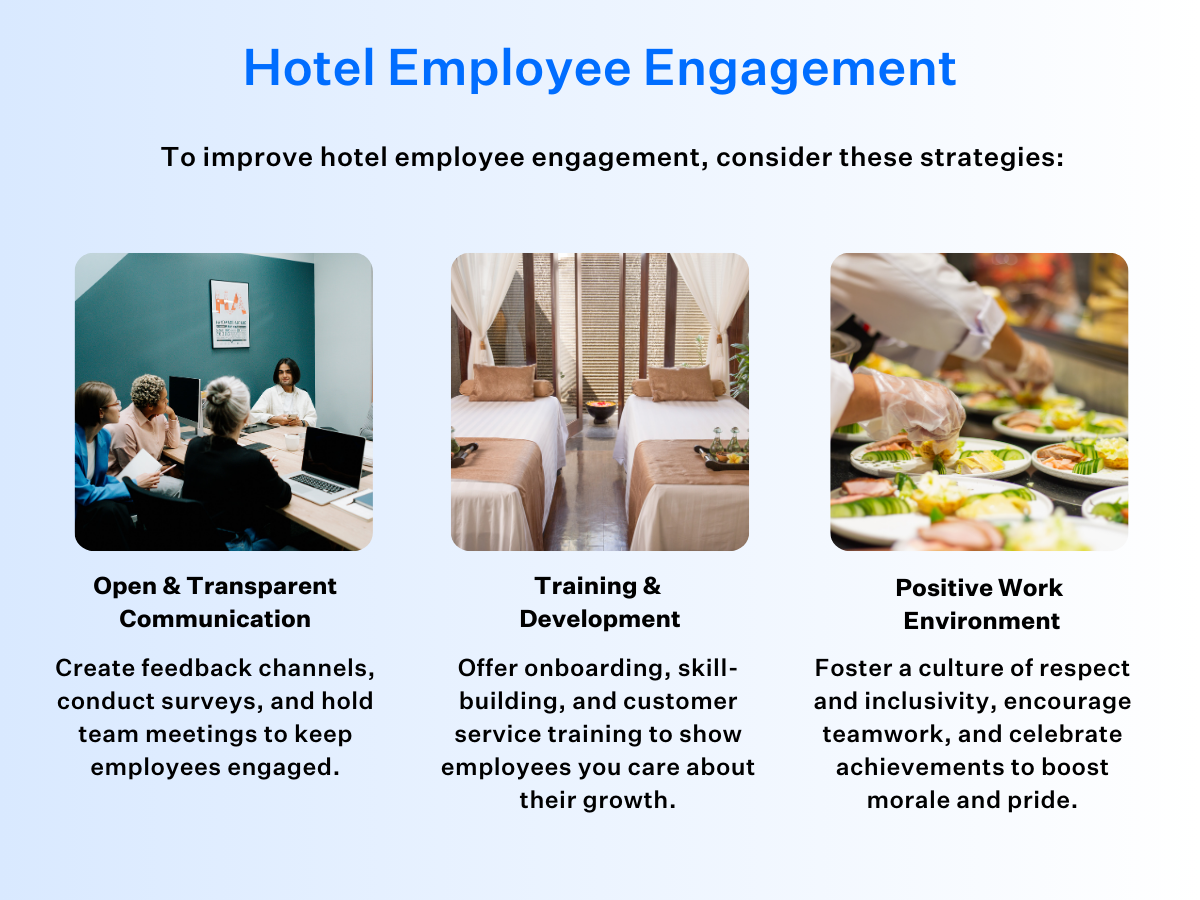What is hotel employee engagement?
Hotel employee engagement is the connection staff feel to their work, their team, and the guest experience. It shows up in how motivated they are, how they solve problems, and how they interact with guests.
Engaged staff do more than the bare minimum; they look for ways to add value, whether they’re an operations manager or a brand new junior hire. That might mean noticing when a guest needs help before they ask, or stepping in to support a teammate during a busy check-in.
In a high-turnover industry, this kind of staff engagement is a practical advantage. It helps reduce churn, improves service consistency, and creates a better experience for everyone who walks through your doors.
The importance of employee engagement in the hospitality industry
In hospitality, your staff are the experience. You can have beautiful rooms and a strong brand, but if the people running the show are unmotivated or burned out, it shows.
Engaged employees are more likely to deliver consistent, high-quality service. They solve problems faster, communicate better across teams, and contribute to a more positive atmosphere, from the front desk to housekeeping.
The payoff for engagement is real. Marriott found that businesses with higher employee engagement saw a 21% boost in productivity and 22% higher profitability. But conversely, any hotel owner or manager can tell you that good staff can be hard to keep. Staff only stick around when they feel valued and are given the right opportunities.
In this article, we’ll show you what you need to know about effective staff engagement, including the benefits, the challenges, and the practical measures you can take starting today to keep your staff engaged – and working with your hotel; not your competitors’.
Table of contents
Challenges of employee engagement practices in the hotel industry
Engaging hotel staff isn’t as simple as handing out rewards or scheduling the occasional team lunch. The challenges are deeper and more structural.
Inconsistent staffing disrupts team dynamics
When people come and go frequently, it’s hard to build momentum. Teams don’t get the chance to gel, and service quality can become unpredictable, especially during busy periods. This means that colleagues stay as acquaintances and don’t develop into true teammates.
Frontline roles are under pressure
From dealing with demanding guests to covering last-minute shift changes, hotel staff are under constant strain. Without clear communication and support, burnout can set in quickly, especially in understaffed teams.
There’s often limited time for development
In a fast-paced environment, training and growth often fall to the bottom of the list. But when staff don’t see a future with your hotel, they’re less likely to stay engaged or loyal. Everyone is looking for the next opportunity. You just have to make sure you’re the one providing it, not your competitors.
Poor management is a dealbreaker
Many employees say their perception of work is shaped by their direct manager. A lack of recognition or support can push even good staff to leave. In fact, 45% of employees have left a job because of poor management.
Bring out the best in your team with SiteMinder
Free up time, reduce pressure, and give your staff the tools theyneed to thrive with SiteMinder
Learn more
How to improve employee engagement in the hotel industry
Improving engagement doesn’t require sweeping changes or big budgets. It’s about making consistent, meaningful improvements in how your team works, communicates, and grows.
Open communication
When staff feel like they’re the last to know, or worse, never asked, it creates a disconnect. Clear, two-way communication builds trust and makes staff feel like they’re part of the bigger picture.
Start small: hold five-minute daily huddles, run short anonymous surveys after busy periods, and make space in weekly meetings to hear from frontline staff. This helps uncover pain points early, avoid miscommunication, and shows your team that their ideas count.
A hotel manager who explains the why behind new policies will always get more buy-in than one who simply posts a notice on the break room door.
Provide growth opportunities
Many staff leave because they can’t see what’s next. Development doesn’t always mean promotions. It could be letting someone from housekeeping shadow the front desk, offering short courses on guest conflict resolution, or giving your top performers more responsibility.
Build it into your culture. Mention progression in onboarding. Celebrate internal promotions, loudly. And give people feedback that includes not just what to improve, but where they could go next. 60% of employees said they would stay longer at a job if there were clear opportunities for career advancement.
Team building activities
When people feel connected to their coworkers, they’re more likely to show up with a positive attitude, even during the toughest shifts.
Think beyond ‘trust falls’. Organise birthday shout-outs, friendly competitions (e.g. most positive guest mentions this week), or even invite staff to contribute ideas for shared social events.
The goal is to create moments where your team can interact without the pressure of their daily tasks. Even a short shared meal (ideally covered by the business!) after a long weekend shift can go a long way in helping teams bond.
Work-life balance
Hospitality roles are physically and emotionally demanding. Without balance, even the best team members will burn out.
Offer predictable schedules when possible and avoid excessive last-minute changes. Allow staff to block out key dates in advance, and if you have tech tools for scheduling, use them to give people more visibility and control over their time.
Celebrate achievements
Recognition doesn’t have to be grand but it has to be real. A sincere “thank you” in front of the team or a small monthly reward for standout service can boost morale more than you’d expect. 68% of employees said they are more likely to stay with a company if they feel recognised for their hard work.
Use your PMS or guest feedback tools to spot standouts. If a guest names a staff member in a review, share it with the team. Recognition helps reinforce the behaviours you want more of.
Implement technology
Technology can reduce friction and give your team more time for delivering great service and building relationships.
A system like SiteMinder can help automate bookings, simplify rate management, and improve communication across departments. That means fewer phone calls chasing availability, fewer double bookings to fix, and more clarity about who’s doing what.

Hotel employee engagement examples
Putting engagement strategies into practice can feel abstract until you see how they play out on the floor. These practical examples show how small shifts in approach can lead to stronger morale, better service, and improved staff retention.
Front desk autonomy builds confidence and loyalty
At a mid-sized urban hotel, the general manager noticed front desk staff felt micromanaged. They were required to escalate nearly every guest complaint to managers, even when they had the skills to resolve the issue themselves. The hotel introduced a policy allowing team members to offer small, predefined gestures like late checkouts or complimentary drinks without needing sign-off.
Within weeks, guest satisfaction scores improved. Staff began reporting higher confidence and job satisfaction in post-shift surveys. Feeling trusted made a clear difference, and turnover slowed.
A simple recognition program lifted housekeeping morale
Turnover in the housekeeping team was high, and morale was low. To address it, management launched a peer-nominated “Star of the Week” award. Winners received a small (but meaningful) bonus and a shout-out during the weekly staff briefing.
Team members started recognising each other’s efforts more often, creating a noticeable shift in atmosphere. After three months, exit interviews showed a stronger sense of connection and pride in the job.
Technology helped reduce stress during peak season
One regional hotel group introduced a platform to automate bookings, room assignments, and rate changes. Previously, staff spent hours each day chasing information across systems and managing tasks manually.
The new tech reduced errors, freed up time, and allowed staff to focus more on guest service. During the busy summer period, team leads reported smoother shifts and less stress. Staff said the changes made their work more manageable and rewarding.

